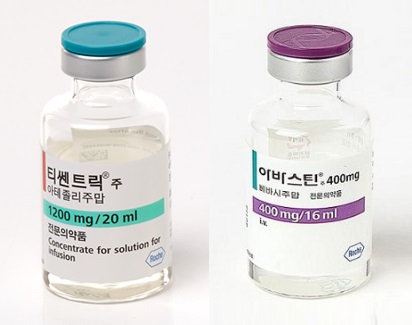The government has been delaying discussing whether to allow reimbursement for Tecentriq (atezolizumab) due to concerns over increased health insurance costs.
However, the arrival of Avastin’s biosimilar may accelerate talks for reimbursement for the combination therapy of Tecentriq and Avastin, industry watchers said.

Samsung Bioepis’ Onbevzi, a biosimilar referencing Roche’s Avastin (bevacizumab), will become reimbursable from September. The insurance benefit raised the possibility that Avastin’s price could be cut by 20 percent.
The reimbursement rate for Onbevzi has been set at 208,144 won ($178.3) for 0.1g/4ml dose, and 677,471 won for 0.4g/16ml, a 69 percent and 63 percent of the original drug Avastin’s reimbursement rate, respectively.
As the biosimilar got insurance benefits, the government can cut Avastin’s price by 20 percent under the local drug pricing policy.
The government may have thought about lowering the drug price of Avastin, regardless of a biosimilar’s arrival.
The National Health Insurance Service (NHIS) had already designated Avastin as a drug subject to the price-volume agreement negotiation system in the third quarter of 2021. The government uses the system to protect the health insurance finance by lowering the drug price and maintaining the large volume of drug usage.
The usage of Avastin, a vascular endothelial growth factor (VEGF) inhibitor, spiked recently as physicians are using more combination therapy consisting of targeted therapy and immunotherapy in cancer treatment.
Avastin is used for colorectal cancer, breast cancer, non-small cell lung cancer, renal cell cancer, glioblastoma, ovarian cancer (fallopian tube or peritoneal cancer), and cervical cancer. Last year, Avastin sold over 120 billion won in Korea, according to IQVIA data.
The government was gauging the possibility of cutting the Avastin price due to the growth of Avastin sales. Then, the reimbursement for the Avastin biosimilar came at the best time to help the government justify lowering the Avastin price.
A lower Avastin price could propel talks to allow reimbursement for Tecentriq in liver cancer treatment.
Roche applied for reimbursement for Tecentriq in combination with Avastin in the first-line treatment of advanced liver cancer.
The Health Insurance Review and Assessment Service (HIRA)’s cancer drug review committee passed the application in February. However, there was no progress in discussion to put the agenda item at a meeting of the drug evaluation committee.
According to physicians, the delay occurred because Avastin costs more than Tecentriq in the Tecentriq plus Avastin combo therapy. Ironically, the government has to spend more for Avastin, whose patent had already expired, than for Tecentriq, new immunotherapy.
Thus, the Avastin biosimilar’s winning of reimbursement and the price cut of Avastin could lead to insurance benefits for Tecentriq in liver cancer treatment, pharmaceutical industry officials said.

